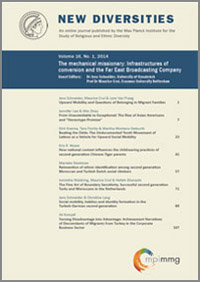Exploring the Value of a Transnational, Reciprocal and Multi-Stakeholder Approach to the Migration-Development Nexus. Case Study: TRANSCODE Programme
by Lothar Smith (Radboud University, Nijmegen),
Fabio Baggio (Scalabrini International Migration Institute, Rome) and
Ton van Naerssen (Avanna Consultancy, Nijmegen)
To cite this article: Smith, L., Baggio, F., & van Naerssen, T. (2014). Exploring the Value of a Transnational, Reciprocal and Multi-Stakeholder Approach to the Migration-Development Nexus. Case Study: TRANSCODE Programme. New Diversities, 16(2), 39–54. https://doi.org/10.58002/nwtk-mz10
There is a prevailing bias, even amongst the actors directly involved, to consider activities falling under the migration-development banner as bipolar engagements, i.e. activities linking a country of origin of migrants to their country of present residence. Such conceptualisations assume the nation-state as the default frame of reference. Whilst progress has certainly been made towards a necessary sophistication of migration related issues in policy thinking and related academic research, the migration-development nexus remains something still often considered as essentially something to approach within a singular or bipolar nation-state framework. This can be seen in studies of potential policy interventions related to transnational flows such as human capital transfers, remittance flows and community development projects initiatives. Taking the case of the Transnational Synergy for Cooperation and Development (TRANSCODE) Programme, and focusing on empirical insights gained with this programme in relation to its conceptual underpinnings, we explore alternative modes of incorporating migration and development. This article thus seeks to provide insights in opportunities for alternative initiatives resulting out of cross-fertilization of experiences and ideas between migrant organisations and other actors engaged in migration and development efforts.
Keywords: transnational development, multi-stakeholder initiatives, migration & development
|
